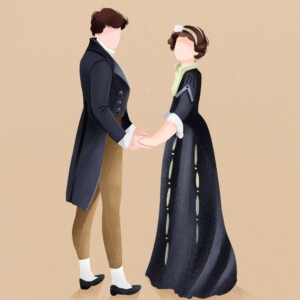
Thursday Nov 30, 2023
Austen’s Legacy: Unraveling the World of Jane Austen’s Novels
Pride and Prejudice book summary
Pride and Prejudice, written by Jane Austen, is a classic novel published in 1813. The story is set in England during the early 19th century and follows the lives of the Bennet family, specifically focusing on Elizabeth Bennet, the second eldest of five sisters.
The main theme of the novel revolves around the societal customs and values of the time, particularly regarding marriage and class distinction. Mrs. Bennet, the mother, is eager to marry off her daughters to wealthy and respectable gentlemen, as their family estate is entailed to a male heir and they have no substantial fortune. This leads to a series of humorous and often tumultuous interactions between the characters.
The plot is primarily driven by the developing relationship between Elizabeth Bennet and Mr. Fitzwilliam Darcy, a wealthy and aloof gentleman. Initially, Elizabeth forms a negative impression of Mr. Darcy based on his prideful and arrogant behavior. However, as the story progresses, she slowly begins to see a different side of him. Likewise, Mr. Darcy has a change of heart and falls in love with Elizabeth, despite her lower social standing.
Throughout the novel, Austen explores the themes of love, reputation, and social expectations. Elizabeth's strong-willed and independent nature clash with the societal norms of the time, as she refuses to marry for financial security alone. She is determined to marry for love and finds it challenging to navigate through the various suitors that come her way.
The novel also delves into the lives of the other Bennet sisters, each with their own unique personality traits and challenges in finding suitable partners. The youngest sister, Lydia, becomes entangled with the devious Mr. Wickham, causing scandal and distress for the family. However, through a series of events, including the interference and guidance of family friends, the misjudgments and misunderstandings among the characters gradually get resolved.
In the end, true love triumphs as Elizabeth and Mr. Darcy overcome their pride and prejudice, realizing the importance of character, honesty, and genuine affection. The novel concludes with their marriage, symbolizing the victory of true love over societal expectations and the pursuit of personal happiness.
Overall, Pride and Prejudice is a timeless love story that explores the complexities of social class, marriage, and the personal growth of its characters. It highlights the importance of seeing beyond first impressions and the value of true love, making it a beloved classic in English literature.
Quotes of Pride and Prejudice book
- "It is a truth universally acknowledged, that a single man in possession of a good fortune, must be in want of a wife."
- "Vanity and pride are different things, though the words are often used synonymously. A person may be proud without being vain. Pride relates more to our opinion of ourselves, vanity to what we would have others think of us."
- "I have been used to consider poetry as the food of love."
- "I could easily forgive his pride, if he had not mortified mine."
- "I wonder who first discovered the efficacy of poetry in driving away love!"
- "I would not be so fastidious as you are for a kingdom! Upon my honour, I never met with so many pleasant girls in my life as I have this evening; and there are several of them you see uncommonly pretty."
- "Angry people are not always wise."
- "To be fond of dancing was a certain step towards falling in love."
- "Your mother will never see you again if you do not marry Mr. Collins, and I will never see you again if you do."
- "There is a stubbornness about me that never can bear to be frightened at the will of others."
Why does Darcy represent pride?
Darcy represents pride mainly due to his haughty and arrogant attitude towards others. He believes himself to be superior to those around him, especially those of lower social status. He refuses to associate with people he deems beneath him and often dismisses their opinions and feelings. His sense of entitlement and snobbish behavior further solidify his representation of pride. Additionally, Darcy's initial reluctance to admit his own faults and his unwillingness to acknowledge the value of others' qualities align with the theme of pride. Overall, Darcy's character embodies the idea of excessive self-regard and the struggles associated with overcoming one's pride.
No comments yet. Be the first to say something!